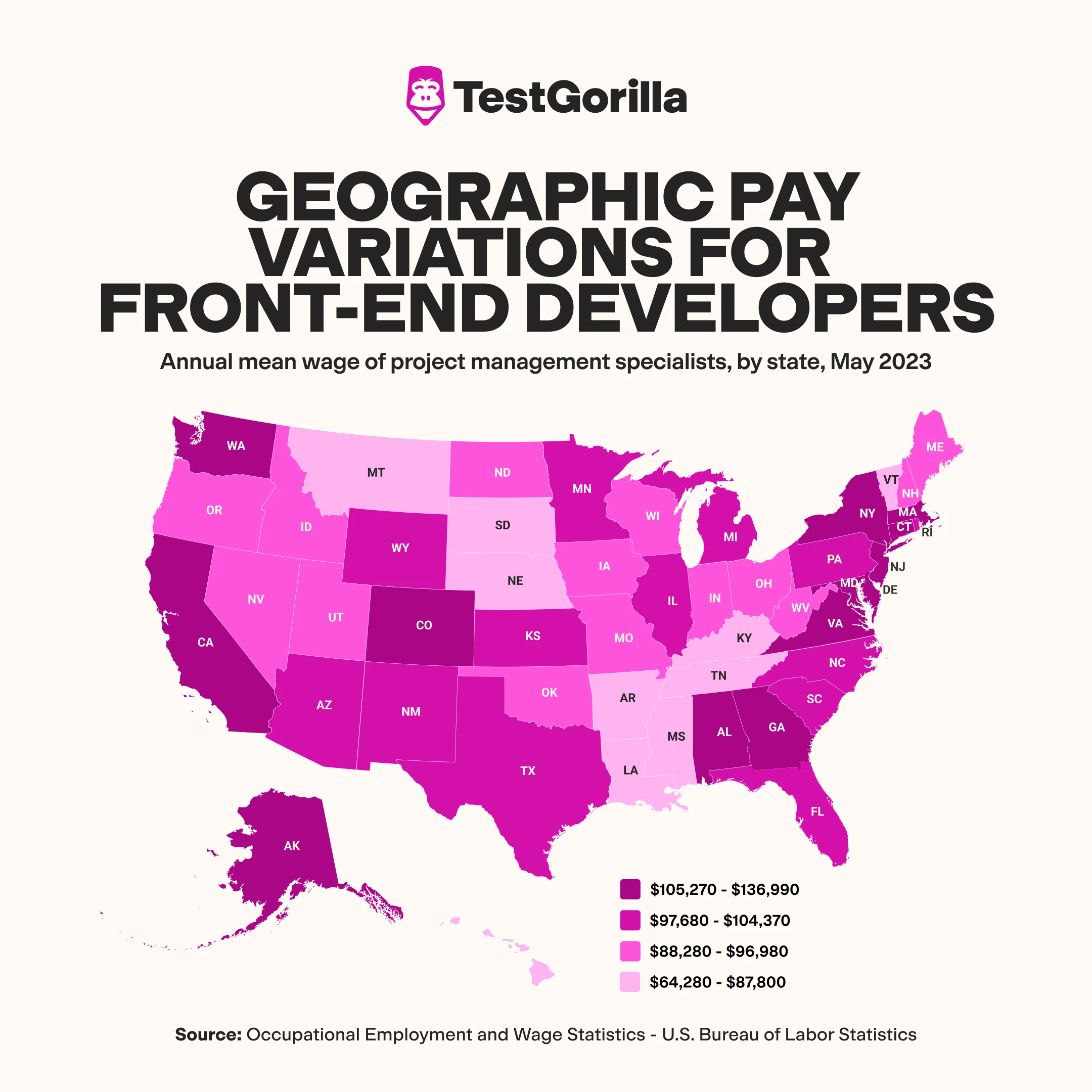Offering the right compensation is key to attracting skilled project managers. But it isn’t just about being competitive with the salary you offer – you need to consider factors like industry, location, and the role’s specific demands to craft a compensation package that appeals to top talent.
Whether you’re hiring a project manager to handle high-stakes projects or one versatile enough to take on multiple responsibilities, we’ve gathered insights on project manager salaries across industries and regions. Plus, we share on finding the right balance between fair pay and drawing in the best project management talent.
How we researched this topic
We consulted the US Bureau of Labor Statistics’ Occupational Employment and Wages, May 2023 report. This comprehensive report provides in-depth information on project management specialists’ salaries, including regional and industry variations, based on employer data from across the US.
Key Takeaways
The median salary for project managers in the US is $74,100, which rises to $163,040 for the highest earners.
The median salary is what most project managers make, whereas the mean is the average salary – but this can be skewed by top earners.
Factors like industry, location, and experience affect salaries.
The highest salaries are found in the tech and oil and gas extraction industries, while project managers in residential construction tend to earn less.
Project manager is a specialized role you can fill by using talent assessments to find the right fit.
Table of contents
National salary statistics for project managers
According to the latest Bureau of Labor Statistics (BLS) data from May 2023, these are the annual and hourly wages for project management specialists.
Pay metric | Annual salary ($) | Hourly wage ($) |
Median | $98,580 | $47.39 |
Mean | $104,920 | $50.44 |
Top 10% earners | $163,040 | $78.39 |
Bottom 10% earners | $57,500 | $27.65 |
Median salary vs. mean salary
When researching project manager salaries, you’ll see two sets of figures: mean salaries and median salaries:
Median salaries: This is the middle point of all project management specialist salaries – half of project managers earn more than this figure, and half earn less. Median salaries are a good indication of typical pay because the highest and lowest earners don’t skew the data.
Mean salaries: This is the average salary, which is calculated by adding up all project management salaries and dividing by the total number of project managers. It’s important to remember that this number can be inflated by extremely high-earning outliers. But, if you want to benchmark across industries or regions, it’s a valuable measure.
Factors influencing salaries
There are a handful of typical factors that impact salaries of individual project managers. Understanding these is essential when deciding what compensation to offer.
Geographic location: Differences in cost of living and demand for project managers significantly affect salary levels across the US. For example, New York and California, which both have high costs of living and employ more project managers than most other states, pay some of the highest salaries. In contrast, states with low living costs and less demand for project managers offer some of the lowest salaries.
Industry: Project management specialists working in hugely profitable industries like tech and oil and gas extraction take home the biggest paychecks, whereas industries with lower profit margins, such as manufacturing, typically pay less.
Required skills: Generally, the more specialized skills a project management role requires, the higher the compensation. Project managers in many of the highest-paying industries manage highly complex projects and need more advanced skills and know-how – such as expertise in specific technical fields.
Education and certifications: Education and certifications can boost project managers’ earnings, usually because they indicate a candidate has certain knowledge and skills. (However, these don’t necessarily mean that a candidate has the specific, up-to-date skills needed for a position.)
Experience: The amount of real-world experience project managers have carries more weight than formal qualifications alone. Experienced project managers often have the sought-after skills and valuable knowledge needed to handle complex projects, which justifies higher salaries.
Geographic pay variations
The annual mean wage of project management specialists ranges from $64,280 to $136,990 across the US, with the top-paying states’ mean salaries falling between $105,270 and $136,990.
Here are the five states offering the highest salaries for project managers, along with their mean annual salaries:
New Jersey (NJ) – $136,990
Washington (WA) – $120,490
Virginia (VA) – $120,150
New York (NY) – $118,800
California (CA) – $117,410
The smallest annual mean salaries project management specialists take home range from $64,280 to $87,800.
The lowest-paying states in the continental US are:
Louisiana (LA) – $87,800
Kentucky (KY) – $87,760
Tennessee (TN) – $87,460
Nebraska (NE) – $85,600
Vermont (VE) – $84,930
Mississippi (MI) – $84,810
South Dakota (SD) – $84,340
Arkansas (AR) – $84,160
Montana (MO) – $82,190
These regional differences are due to geographic location and demand.
Many of the highest-paying states are known for high-demand industries that need highly skilled project managers. This increases the competition for top talent and drives up salaries in those regions. The lowest-paying states have a lower concentration of such industries, resulting in lower salary averages for project managers.
Industry pay variations
Highest-paying industries for project managers
This table shows the highest-paying industries for project management specialists:
Highest-paying industries | Average annual salary |
Web search portals, libraries, archives, and other information services | $ 186,040 |
Oil and gas extraction | $ 144,750 |
Securities, commodity contracts, and other financial investments and related activities | $ 139,990 |
Federal, state, and local government, excluding state and local government schools and hospitals and the US Postal Service (OEWS designation) | $136,960 |
Aerospace product and parts manufacturing | $ 134,200 |
These high-paying industries share several key characteristics that contribute to their project managers higher-than-average salaries:
They’re heavily regulated industries. Four of the five top-paying industries for project managers – oil and gas, securities, Federal, and aerospace – operate under strict compliance requirements. This adds more responsibility to project managers’ roles, as they must comply with various regulations to avoid serious penalties.
They involve large-scale complex projects. The highest-paying industries deal with large-scale, complex projects that require expert handling. These companies are willing to pay more for skilled project managers who’ll mitigate risk and ensure projects are completed successfully.
They require specialized technical expertise. All five top-paying industries require niche technical expertise, which comes at a price. For example, project managers in aerospace product and parts manufacturing must understand multiple advanced technologies (like precision engineering and avionics) and have managerial expertise.
There are high financial stakes. Projects typically involve huge investments, and failure or success can greatly impact a company’s overall financial health. Companies are happy to pay a premium to attract the most capable project managers.
They involve long project timelines. It’s not unusual for projects to span years. Long-term project management takes sustained leadership, foresight, and the ability to adapt to changing circumstances to keep projects on track. Candidates with the necessary range of skills, experience, and a strategic mindset command a higher price.
Lower-paying industries for project managers
Industries where project managers earn some of the lowest salaries include manufacturing, agriculture, and transportation-related sectors.
Several factors may contribute to project managers’ lower pay scales in lower-paying industries:
They’re labor-intensive. In these industries, most of the workforce is involved in physical labor and routine tasks that don’t typically need a high level of project management expertise. So, project management roles may be less in demand, leading to lower compensation.
There are lower profit margins. Many of the lower-paying industries operate on much lower profit margins than the highest-paying sectors. Companies might want to pay more, but limited financial resources available impact what they can offer their project managers.
They involve less complex projects: Projects in these industries are often more process-oriented and predictable – and don’t need as much strategic oversight. The result? Fewer project managers with high compensation packages.
There are economic and external influences. These industries tend to be more impacted by external factors that can affect project budgets. For example, weather conditions, climate change, and government policies influence agriculture. And manufacturing is reliant on consumer demand and can be heavily impacted by supply chain disruptions and international trade.
Pay by experience and education
Here are the average salaries for project managers in the US at different stages of their careers:
Entry-level (0-2 years): $79,520/year or $38.90/hour
Mid-career (3-6 years): $95,716/year or $46.82/hour
Senior (7+ years): $109,804/year or $53.71/hour
Certifications and education that can lead to higher pay
Certifications and education that can boost project managers’ salaries include:
Project Management Professional (PMP): Offered by the Project Management Institute (PMI), this is one of the most widely recognized project management certifications.
Certified ScrumMaster (CSM): This Scrum Alliance certification is aimed at project managers working in tech and software development and focuses on the Scrum framework.
Agile Certified Practitioner (PMI-ACP): Another PMI certificate, the PMI-ACP demonstrates project managers’ expertise in agile practices, making it beneficial for industries where agile methodologies are central.
Six Sigma Certification: These certifications are offered by various providers and focus on operations-heavy industries. The Six Sigma Green Belt and Black Belt certifications signify varying levels of expertise in process management.
Master’s in Business Administration (MBA) with a Project Management Focus: Combining business strategy with project management skills, this qualification provides advanced knowledge in both fields.
Benefits beyond salary
When attracting and hiring project managers, offering benefits alongside a competitive salary can make a big difference. Key benefits include:
Health insurance. Quality health benefits can be a dealbreaker for highly skilled project managers deciding between job offers with similar pay.
Paid time off (PTO). A generous PTO policy can be particularly attractive to project managers, as it’ll help them balance their demanding work with personal time.
Professional development opportunities. Many professional project management certifications require ongoing training to stay valid. Likewise, project management frameworks and technology are regularly updated, so continuous education is also essential. Covering the costs of certifications, training, or even conferences can help you stand out from the crowd.
Wellness benefits. With 76% of project managers reporting stress from their main projects, wellness benefits – like gym memberships, stress management resources, or mental health support – show you care about their well-being.
Travel stipends. These can be highly beneficial for project managers who travel frequently for client meetings or site visits.
Retirement benefits. For example, matching project managers’ 401(k) contributions can help them secure their financial future. Plus, retirement benefits can encourage employees to stay committed to the company.
Equity compensation. Startups often offer this to appeal to project managers when they can’t compete with the high salaries of more established companies.
The best insights on HR and recruitment, delivered to your inbox.
Biweekly updates. No spam. Unsubscribe any time.
Level up your hiring process with talent assessments
Competitive compensation is key to attracting project managers, and understanding salary benchmarks across the US gives you clarity on whether your offering is fair.
But how can you be sure your applicants have the skills you need to command the package you offer? Their credentials alone won't tell you.
That’s where talent assessments step in.
Within TestGorilla's library of 400+ tests, you’ll find various tests you can use to screen each of your project manager applicants easily, accurately, and quickly. Combine multiple tests into one assessment that’s perfect for your role.
Unlike traditional bias-prone methods of screening applicants (like resume screening), our assessments are data-driven and backed by science. Candidates easily complete them online, and our system automatically scores them so you can pick the top scorers to interview.
We have various tests for project managers you might include in your assessment. Take a peek at our Project Management test or Leadership & People Management test. Peruse our test library for more tests that might be relevant to your role – for instance, our Six Sigma test.
To learn more, sign up for our free plan or book a demo. All customers can post remote roles on our job board.
FAQs
How much should a project manager cost?
The cost of hiring a project manager depends on several factors, including location, industry, the company’s typical recruitment costs, and the individual’s education, experience, and certifications. The mean annual wage for project management specialists in the US is $104,920.
What is the lowest pay for a project manager?
The lowest pay for project managers is typically for entry-level positions. Usually, those with the least experience are paid the smallest salary, but factors like industry, location, and company size greatly impact project manager pay.
What is a poor project manager?
Poor project managers struggle to effectively lead projects, often due to poor communication, inability to lead, and poor decision-making.
You've scrolled this far
Why not try TestGorilla for free, and see what happens when you put skills first.





















